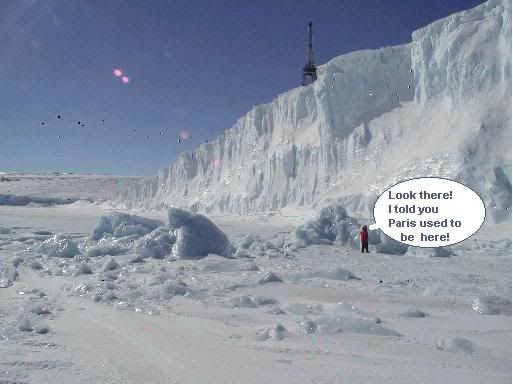 The ocean current that gives western Europe its relatively balmy climate is stuttering, raising fears that it might fail entirely and plunge the continent into a mini ice age. The dramatic finding comes from a study of ocean circulation in the North Atlantic, which found a 30% reduction in the warm currents that carry water north from the Gulf Stream. The slow-down, which has long been predicted as a possible consequence of global warming, will give renewed urgency to intergovernmental talks in Montreal, Canada, this week on a successor to the Kyoto Protocol.
The ocean current that gives western Europe its relatively balmy climate is stuttering, raising fears that it might fail entirely and plunge the continent into a mini ice age. The dramatic finding comes from a study of ocean circulation in the North Atlantic, which found a 30% reduction in the warm currents that carry water north from the Gulf Stream. The slow-down, which has long been predicted as a possible consequence of global warming, will give renewed urgency to intergovernmental talks in Montreal, Canada, this week on a successor to the Kyoto Protocol.| I'm sure it will, right or wrong. The weather gets hot, it's evidence of global warming. The weather gets cold, it's evidence of global warming. I'm starting to miss the nuclear winter... |
The North Atlantic is dominated by the Gulf Stream â currents that bring warm water north from the tropics. At around 40° north â the latitude of Portugal and New York â the current divides. Some water heads southwards in a surface current known as the subtropical gyre, while the rest continues north, leading to warming winds that raise European temperatures by 5°C to 10°C. But when Brydenâs team measured north-south heat flow last year, using a set of instruments strung across the Atlantic from the Canary Islands to the Bahamas, they found that the division of the waters appeared to have changed since previous surveys in 1957, 1981 and 1992. From the amount of water in the subtropical gyre and the flow southwards at depth, they calculate that the quantity of warm water flowing north had fallen by around 30%.
When Bryden added previously unanalysed data â collected in the same region by the US governmentâs National Oceanic and Atmospheric Administration â he found a similar pattern. This suggests that his 2004 measurements are not a one-off, and that most of the slow-down happened between 1992 and 1998. The changes are too big to be explained by chance, co-author Stuart Cunningham told New Scientist from a research ship off the Canary Islands, where he is collecting more data. "We think the findings are robust."
But Richard Wood, chief oceanographer at the UK Met Officeâs Hadley Centre for climate research in Exeter, says the Southampton team's findings leave a lot unexplained. The changes are so big they should have cut oceanic heating of Europe by about one-fifth â enough to cool the British Isles by 1°C and Scandinavia by 2°C. "We havenât seen it yet," he points out.
Though unseasonably cold weather last month briefly blanketed parts of the UK in snow, average European temperatures have been rising, Wood says. Measurements of surface temperatures in the North Atlantic indicate a strong warming trend during the 1990s, which seems now to have halted. Bryden speculates that the warming may have been part of a global temperature increase brought about by man-made greenhouse warming, and that this is now being counteracted by a decrease in the northward flow of warm water. After warming Europe, this flow comes to a halt in the waters off Greenland, sinks to the ocean floor and returns south. The water arriving from the south is already more saline and so more dense than Arctic seas, and is made more so as ice forms.
But Brydenâs study has revealed that while one area of sinking water, on the Canadian side of Greenland, still seems to be functioning as normal, a second area on the European side has partially shut down and is sending only half as much deep water south as before. The two southward flows can be distinguished because they travel at different depths.
Nobody is clear on what has gone wrong. Suggestions for blame include the melting of sea ice or increased flow from Siberian rivers into the Arctic. Both would load fresh water into the surface ocean, making it less dense and so preventing it from sinking, which in turn would slow the flow of tropical water from the south. And either could be triggered by man-made climate change. Some climate models predict that global warming could lead to such a shutdown later this century. The last shutdown, which prompted a temperature drop of 5°C to 10°C in western Europe, was probably at the end of the last ice age, 12,000 years ago. There may also have been a slowing of Atlantic circulation during the Little Ice Age, which lasted sporadically from 1300 to about 1850 and created temperatures low enough to freeze the River Thames in London.
